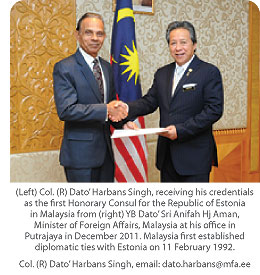Country Feature: Estonia An Exceptional Investment Destination

Overview
Estonia is located at the heart of the Baltic Sea Region, one of the fastest-growing economic blocs in Europe. It is bordered by Finland, Sweden, Latvia and Russia. The country has a land area of 45,227 sq km, with about half of it covered by lush forests. The climate in Estonia is humid and temperate, characterised by warm summers and fairly severe winters. Around 1.34 million people reside in Estonia with 30% of them concentrated in the capital Tallinn. It is reported to be one of the least densely populated countries in the world.
Historically, Estonians were once subjected to Danish, Teutonic, Swedish and Russian rule. The country regained its independence on 20 August 1991. Since then, it has embarked on a rapid programme of social and economic transformation.
Economic Overview
Estonia has a liberal market-based economy with phenomenal growth potential, offering good access to Russia, the CEE countries and the EU region. Government debt is among the lowest in Europe and the economy has shown tremendous resilience in the face of the global economic crisis. Among other international agreements and memberships, Estonia is a member of the European Union (EU) and North Atlantic Treaty Organisation (NATO). This dynamic Nordic country also has close economic ties with Scandinavia and Western Europe.
Supported by its excellent business environment, stable economic policy and moderate costs, Estonia has over the years attracted numerous international companies to its shores.
Why Estonia?
There are many advantages that make Estonia the perfect investment destination, including political and economic stability, accessibility, ease and low cost of doing business as well as investor equality. In fact, The World Bank Group has ranked Estonia among the top 25 countries in the Ease of Doing Business index.
Estonian business regulations are known to be less rigid than its neighbouring countries. The tax system is simple, transparent and extremely business friendly. Additionally, labour costs are relatively low – just one third of those in Sweden or Finland. It also boasts a highly skilled and educated workforce.
Telecommunications and transportation are well developed in Estonia, with an efficient road network spanning the entire country. Its international airport in Tallinn serves direct flights to numerous European cities.
Business Opportunities
The economy offers key opportunities for investors in a number of sectors including ICT, electronics, machinery and metalworking, wood processing, logistics/transport and food. Other key sectors include oil shale-based energy production, textiles, chemical products, banking, fishing, timber and wood products and shipbuilding.
The thriving IT sector in Scandinavia has had a positive impact on Estonia, which has developed expertise in specialised markets such as office machinery assembly services and electronic equipment manufacture. Estonia has one of Europe’s most modern telecommunications networks and a high degree of IT literacy and technology penetration.
This is a country with an exceptional business environment that has allowed highly successful companies like SKYPE (www.skype.com), Playtech (www.playtech.com), Swedbank (www.swedbank.com), Ericsson (www.ericsson.com), Tallink Group (www.tallink.com), ABB (www.abb.com), Elcoteq (www.elcoteq.com) and others to flourish.
| Several growth areas have also been indentified: |
|
Business At A Glance
- Estonia has been ranked 14th in the Index of Economic Freedom (2011, Wall Street Journal/The Heritage Foundation), 17th in the Ease of Doing Business Report (2011, World Bank), and 35th in the Global Competitiveness Report (2010, World Economic Forum).
- Estonia has some of the highest credit ratings in the region (Fitch IBCA, Standard & Poor’s, Moody’s).
- On 1 January 2011, Estonia became a member of the euro area.
- 0% corporate income tax is imposed on all reinvested earnings in Estonia.
- The Estonian cost level is still significantly lower than that of neighbouring Scandinavian countries.
- In Estonia, all capital is treated equally, foreign or domestic.
- Estonia is a member of the International Center for the Settlement of Investment Disputes, the Multilateral Investment Guarantee Agency, and the New York Convention.
- Estonia is the leading country in Central and Eastern Europe in terms of attracting foreign direct investments.
- Estonia is one of the leading countries in the world in creating and implementing e-government solutions and cyber security.
- Estonia is within 3 hours flight from most major European, Scandinavian and Russian cities.

Prime Minister of Estonia Andrus Ansip made the following statement during a meeting on 3 October 2011 with the Indian Cabinet Minister for Heavy Industries and Public Enterprises Praful Patel and the business delegation accompanying him:
![]() Although Estonia is a small country, its liberal economic model provides foreign investors with attractive prospects for business not only on the local market, but throughout the European Union. Take no notice of the fact that Estonia has such a small population. Look at Estonia as a gateway to the wider market of the European Union – with 500,000,000 people.
Although Estonia is a small country, its liberal economic model provides foreign investors with attractive prospects for business not only on the local market, but throughout the European Union. Take no notice of the fact that Estonia has such a small population. Look at Estonia as a gateway to the wider market of the European Union – with 500,000,000 people.![]()
The Honourable Prime Minister also explained that the reduced currency risk related to the transition to the single currency, the free movement of capital, people and services within the European Union and Estonia’s tax system made it an attractive base from which to do business across the continent.
Estonian Investment and Trade Agency (EITA)
For those interested in investing in Estonia, the Estonian Investment and Trade Agency (EITA) acts as a one-stop agency offering a variety of services to help facilitate the investment process.
EITA Head Office
Enterprise Estonia
Lasnamäe 2, 11412 Tallinn.
Phone: +372 6 279 700 • Fax: +372 6 279 701 • Website: www.investinestonia.com
